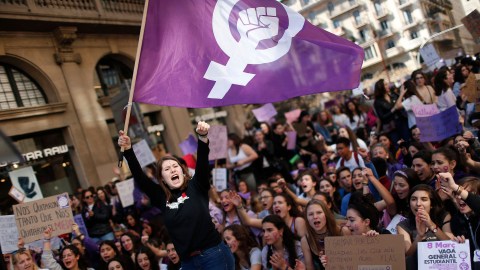Do feminists actually dislike men?

- Feminists are often stereotyped as disliking men. It’s a view that prevents a lot of people from supporting the movement.
- A recently published study found that feminists were no more hostile to men than non-feminists.
- By extension, the study shows that men have no need to fear the feminist movement. Feminists aren’t out to get men; they’re simply advocating for gender equality.
Feminism has a bit of a PR problem. Despite the movement’s success in securing suffrage, property rights, marital equality, fairer pay, and reproductive autonomy for women, among many other things, feminists themselves are often viewed negatively. In a 2022 global Ipsos survey, one-third of men and even one-fifth of women opined that feminism does more harm than good. A 2020 Pew survey of Americans found that 45% view the movement as “polarizing.”
Stereotyped as man-hating lesbians
“A key factor in the continued derision of feminism is the widely endorsed stereotype that feminists are man-haters,” an international group of researchers wrote in a recent study published in the journal Psychology of Women Quarterly. “Qualitative investigations show that feminists are seen as unfeminine, man-haters, and lesbians. Likewise, quantitative evidence suggests feminists are negatively stereotyped as disliking men or ‘anti-male.’ Many studies including those with diverse samples show that this stereotype deters women from identifying as feminist.”
That group, consisting of dozens of researchers from around the world, was led by Aífe Hopkins-Doyle at the University of Surrey, Aino Petterson at the University of Oslo, and Robbie Sutton at the University of Kent. Over the last couple of years, they put the “man-hating” stereotype to the test. Across five studies, they interviewed thousands of people around the world, gauging their levels of feminism and their feelings toward men.
In the first, the researchers interviewed 1,664 women in Italy, Poland, the U.S., and the UK. They found that women who scored high on measures of feminism were no more hostile toward men than non-feminist women. They then repeated the study but with 3,892 participants in China, India, Japan, South Korea, and Taiwan. The results were the same: Feminists reported no less liking and trust of men than non-feminists.
While feminist participants might explicitly state that they bear no ill will toward men, perhaps their subconscious reactions reveal the opposite. So the researchers recruited 189 women to take an implicit association test. While sitting at computers, participants were quickly flashed words associated with maleness (such as “he,” “mister,” “Kevin”), along with good (“wonderful,” “celebrating”) and bad (“terrible,” “horrible”) evaluative words and asked to sort the words into their respective categories. Sometimes, subjects were told to group good/male words together and other times bad/male words together. Feminists and non-feminists both performed similarly at these grouping tests, indicating that feminists don’t implicitly associate maleness with negative qualities.
In the final two studies, each with about 2,000 participants, the authors surveyed people in the U.S., UK, and Poland about their perceptions of both feminists and men. They found that subjects measuring higher in feminism tended to view men as more threatening. This is an understandable belief. A top cause of death for pregnant and postpartum women is homicide, most often committed by their male partners. One out of every six women in the U.S. has been the victim of a completed or attempted rape. Four in five have experienced some form of sexual harassment.
Stereotype debunked
Participants in the surveys also greatly underestimated feminists’ feelings of warmth toward men, further evincing how entrenched “anti-male” stereotypes of feminists are.
While the researchers broadly debunked the stereotype that feminists dislike men, they do not deny that certain groups of feminists might hold misandrist feelings. Cultural feminists, who advocate for so-called feminine values concerning gentleness and peace, and radical feminists, who see men as oppressors, are more likely to be negative toward men.
By extension, the study shows that men have no need to fear the feminist movement. Almost a quarter of men globally think that “feminism has resulted in men losing out in terms of economic or political power or socially.” Feminists, who can be male or female, aren’t out to get men; they’re simply advocating for gender equality.
As self-avowed feminist and former U.S. president Barack Obama wrote in a 2016 essay, “When everybody is equal, we are all more free.”





